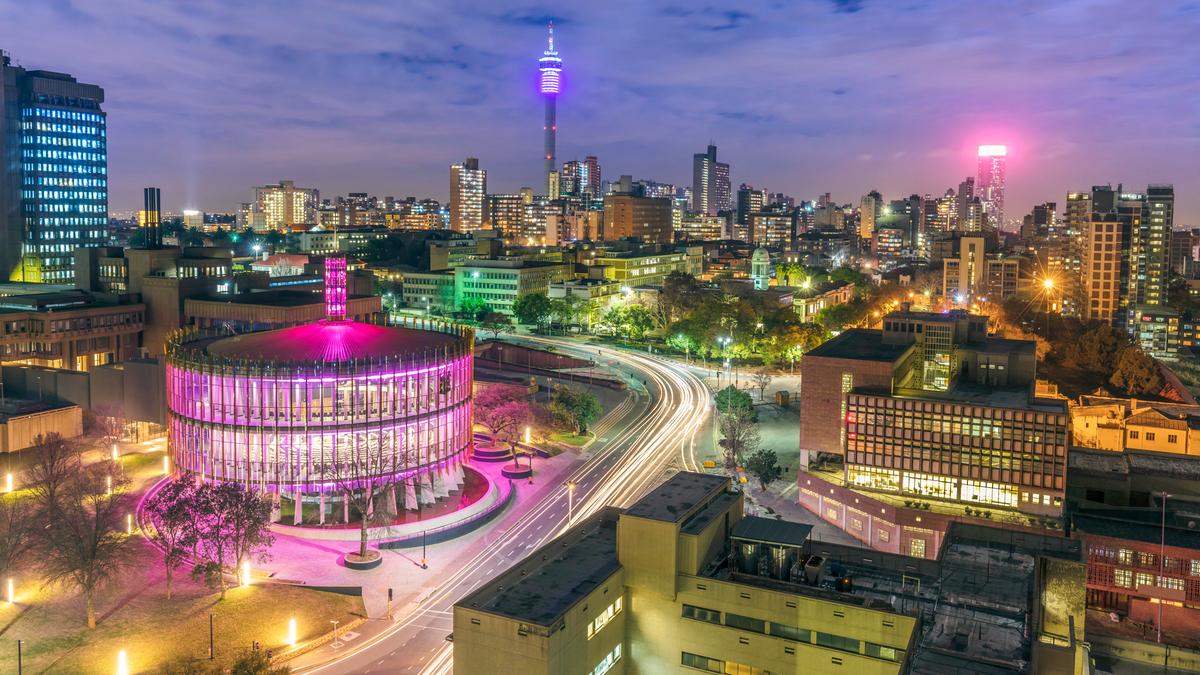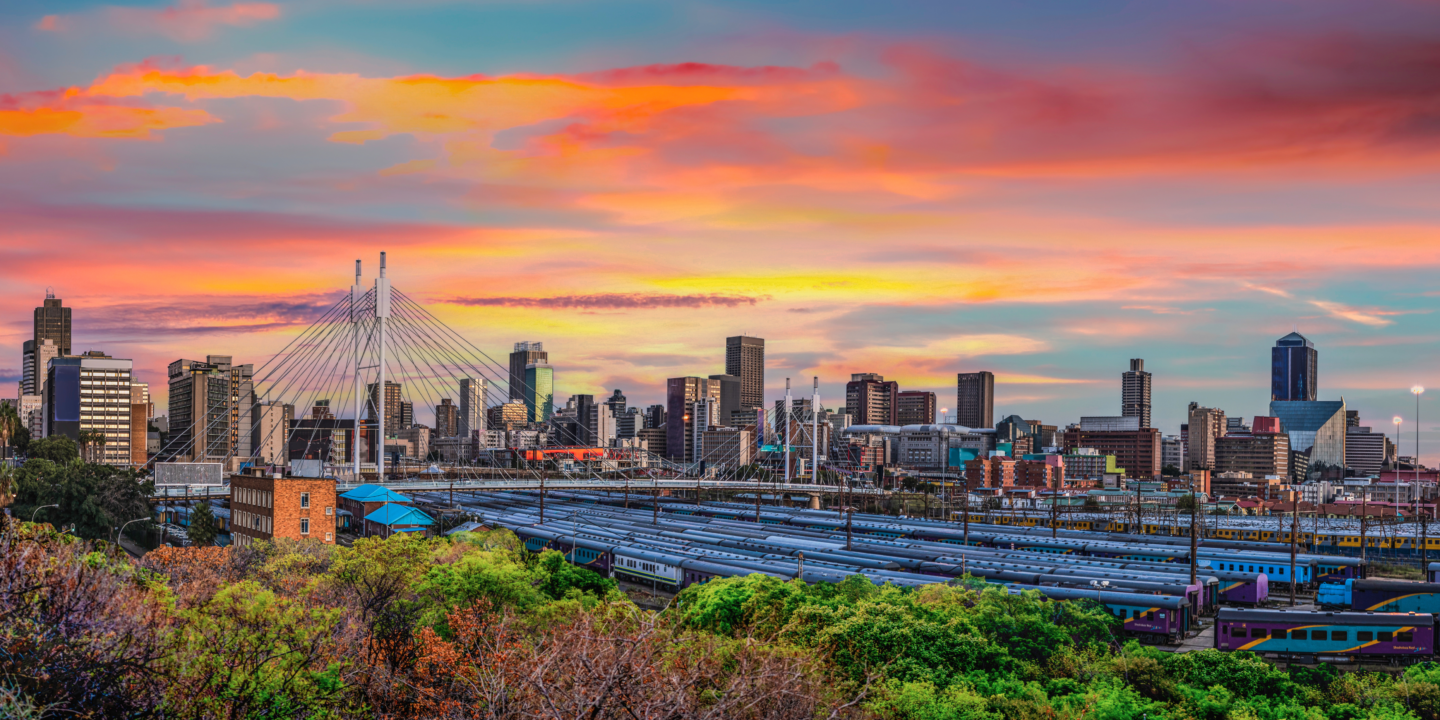



Johannesburg, also known as Jo’burg or Jozi, is South Africa’s largest city and a vibrant hub of culture, commerce, and history. Often referred to as the "City of Gold" due to its origins in the gold mining industry, Johannesburg is a dynamic and energetic metropolis that blends modernity with deep-rooted cultural significance.
April to September (Dry Season): The best time to visit Johannesburg is during the dry season, from April to September. The weather is sunny with cooler temperatures, making it perfect for outdoor activities and sightseeing. Winters (May to August) can be chilly, especially in the evenings, with temperatures dropping to 5-10°C (41-50°F) during the night.
October to March (Rainy Season): While Johannesburg experiences summer rains between October and March, the weather is warmer, with temperatures ranging from 15°C to 30°C (59°F to 86°F). The rain usually comes in short bursts, often in the afternoon, leaving you with plenty of time to explore the city.
By Air:
O.R. Tambo International Airport (JNB) is the major international gateway to Johannesburg, located about 20 minutes from the city center. It is one of the busiest airports in Africa and offers direct flights from major cities like London, New York, Dubai, and Sydney.
By Train:
Shosholoza Meyl operates long-distance trains connecting Johannesburg to other cities in South Africa, including Cape Town and Durban.
By Car:
Johannesburg is easily accessible by road from other South African cities. The drive from Pretoria takes about 45 minutes, and the drive from Cape Town is about 13-14 hours.
By Bus:
Long-distance buses like Greyhound, Intercape, and Translux operate routes from various cities within South Africa to Johannesburg.
Apartheid Museum:
The Apartheid Museum is a must-visit to understand South Africa's dark past and the struggle against apartheid. The museum offers immersive exhibits that tell the story of South Africa's political and social history, particularly the fight for equality and democracy.
Constitution Hill:
This historical site houses the Constitutional Court of South Africa and is a former prison complex. It offers insightful tours about South Africa's journey to democracy and its history of political imprisonment, including Nelson Mandela and Mahatma Gandhi.
Soweto (South Western Township):
Visit the famous Soweto district to learn about its historical significance in the anti-apartheid struggle. Key sites include Vilakazi Street, where Nelson Mandela and Archbishop Desmond Tutu once lived, and the Hector Pieterson Memorial, commemorating the 1976 Soweto Uprising.
Maboneng Precinct:
A trendy cultural district in the heart of Johannesburg, Maboneng is full of art galleries, boutique shops, cafes, and street food vendors. It’s a great place to explore local art, fashion, and culinary scenes.
Gold Reef City:
For a more fun and family-friendly activity, Gold Reef City is an amusement park and former gold mine offering rides, live entertainment, and interactive exhibits on Johannesburg’s gold mining history.
The Lion & Safari Park:
Located just outside Johannesburg, this park allows visitors to experience the thrill of seeing lions, cheetahs, giraffes, and other wildlife up close. It's a great way to enjoy a safari experience without leaving the city.
Neighbourgoods Market:
A vibrant food market located in the Braamfontein area, offering a mix of local and international cuisine, organic produce, and artisanal goods. It's a fantastic place for foodies to discover Johannesburg's growing gourmet scene.
Johannesburg Botanical Gardens:
For a peaceful escape from the city, the Johannesburg Botanical Gardens in Emmarentia offer lush landscapes and beautiful walking paths, perfect for picnics and relaxing strolls.
Explore Soweto:
Take a guided tour of Soweto to learn about the legacy of apartheid and the town's pivotal role in the country’s social transformation. Visit the Nelson Mandela House and the Soweto Uprising Memorial.
Visit the Cradle of Humankind:
Just outside Johannesburg, the Cradle of Humankind is a UNESCO World Heritage Site and one of the richest sources of early hominid fossils. Visit the Sterkfontein Caves to explore this fascinating archaeological site.
Go Shopping at Sandton City Mall:
One of the largest shopping centers in Africa, Sandton City is the place for high-end shopping, featuring global luxury brands and designer boutiques. It's a major retail hub of Johannesburg.
Take a Walking Tour of Maboneng:
Discover the vibrant street art, gallery spaces, and pop-up shops in Maboneng Precinct. The area’s youthful vibe and artistic flair make it a must-see for culture lovers.
Visit the Market Theatre:
The Market Theatre is one of South Africa’s premier theatres and a symbol of the resistance to apartheid. Catch a performance to experience South African arts and drama at its finest.
Luxury:
The Saxon Hotel: Known for its luxurious spa and serene environment, The Saxon in Sandhurst offers world-class service and elegant rooms.
Four Seasons Hotel The Westcliff: This 5-star hotel offers stunning views of Johannesburg's skyline and beautifully landscaped gardens.
Mid-Range:
The Peech Boutique Hotel: A stylish boutique hotel in Melrose offering a contemporary experience with eco-friendly initiatives and chic decor.
The Leonardo: A new luxury property in the heart of Sandton, known for its modern architecture and excellent amenities.
Budget-Friendly:
The Backpack: A budget-conscious and eco-friendly hostel offering dormitory-style accommodation and private rooms.
Curiocity Johannesburg: A cool and modern hostel in Maboneng, offering affordable stays with a youthful vibe.
Braai (BBQ): South Africa's love for braai (barbecue) can be experienced at local restaurants such as The Butcher Shop & Grill and The Braai Room. Try boerewors (sausage), biltong (dried meat), and other classic dishes.
Local Delicacies: Try dishes like pap (maize porridge) with sauce, bunny chow (curry in a bread bowl), and malva pudding (a spongy dessert).
Fine Dining: Johannesburg has a blossoming food scene, with top restaurants like DW Eleven-13, Marble, and The Test Kitchen offering innovative South African cuisine.
Street Food: Experience the bustling street food culture in Maboneng or Rosebank with samosas, vetkoek (fried bread with fillings), koeksisters (fried dough pastry), and local snacks.
Multiculturalism: Johannesburg is a melting pot of cultures, with influences from various African communities, Europeans, and immigrants from around the world. This is reflected in the city’s food, art, and music.
Jazz Culture: Johannesburg is the birthplace of South African jazz and remains a key center for jazz music. Enjoy live jazz performances at venues like The Orbit and Basement Jazz.
African Art: The city has a thriving art scene, with galleries like the Johannesburg Art Gallery, Wits Art Museum, and Art Africa showcasing works from across the continent.
Historical Significance: Johannesburg is rich in history, particularly regarding the apartheid struggle, with notable sites like Constitution Hill, The Apartheid Museum, and Soweto offering deep insights into South Africa’s social and political evolution.
✔️ Safety: While Johannesburg is a vibrant city, like any large city, it's important to be cautious. Stick to well-lit areas at night, avoid displaying valuables, and use Uber or registered taxis for transport.
✔️ Transport: Johannesburg's public transport system is limited, so renting a car or using Uber is the most convenient way to get around.
✔️ Weather: Johannesburg’s weather can be unpredictable, with chilly evenings even in summer, so pack a light jacket for the evenings.